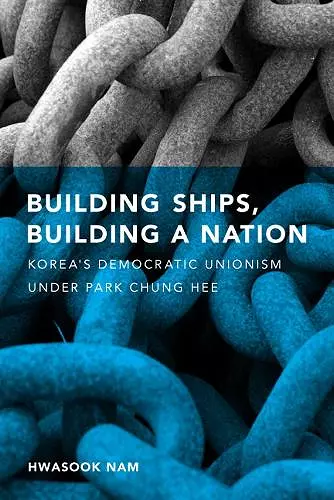Building Ships, Building a Nation
Korea's Democratic Unionism Under Park Chung Hee
Format:Hardback
Publisher:University of Washington Press
Published:15th Nov '11
Currently unavailable, and unfortunately no date known when it will be back
This hardback is available in another edition too:
- Paperback£27.99(9780295988993)

Reassesses the relationships among labor, the state, and economic development in South Korea by chronicling the Korea Shipbuilding and Engineering Corporation labor union's fight for equal rights and higher wages in the 1960s and '70s.
Examines the rise and fall, during the rule of Park Chung Hee (1961-79), of the combative labor union at the Korea Shipbuilding and Engineering Corporation (KSEC), which was Korea's largest shipyard until Hyundai appeared on the scene in the early 1970s. This work focuses on the perceptions, attitudes, and discourses of the heavy-industry workers.
Building Ships, Building a Nation examines the rise and fall, during the rule of Park Chung Hee (1961-79), of the combative labor union at the Korea Shipbuilding and Engineering Corporation (KSEC), which was Korea's largest shipyard until Hyundai appeared on the scene in the early 1970s. Drawing on the union's extraordinary and extensive archive, Hwasook Nam focuses on the perceptions, attitudes, and discourses of the mostly male heavy-industry workers at the shipyard and on the historical and sociopolitical sources of their militancy. Inspired by legacies of labor activism from the colonial and immediate postcolonial periods, KSEC union workers fought for equality, dignity, and a voice for labor as they struggled to secure a living wage that would support families.
The standard view of the South Korean labor movement sees little connection between the immediate postwar era and the period since the 1970s and largely denies positive legacies coming from the period of Japanese colonialism in Korea. Contrary to this conventional view, Nam charts the importance of these historical legacies and argues that the massive mobilization of workers in the postwar years, even though it ended in defeat, had a major impact on the labor movement in the following decades.
"."A pioneering work on contemporary Korean history, Building Ships, Building a Nation will occupy a central place in the emerging literature of the post-war period.... Nam gives voice and agency to a segment of society and a period of time that were relegated to silence for many years, and in the process profoundly alters our understanding of South Korean state and society."
(Asian Studies Association, in awarding the 2011 James B. Palais Book Prize)"Overall, the account is a reminder that economics that fail to capture cultural and historical, and even emotional, context is rather senseless….His comments on labour in Korea bring to life the decades of labour-capital tensions that were, and still are, the backdrop for Korea's economic miracle."
(International Journal of Maritime History)"Apart from presenting a case study of a union and its members with microhistorical depth, Building Ships, Building a Nation fills a lacuna of knowledge on workers in the twentieth century, serving as an indispensable contribution to scholarship on labor relations in contemporary Korea and East Asia."
(Journal of Asian Studies)"This wonderful book restores a buried history of union activism in the Korea Shipbuilding and Engineering Corporation (KSEC) . . . and situates it in the larger context of militant and democratic labor movements in Korean society since the colonial period. . . . It is a welcome addition to the body of critical studies on modern and contemporary Korea that convey nuanced analyses of Korea's social history."
(American Historical Review)"Focuses on the mostly male heavy industry workers at the shipyard and on historical and sociopolitical sources of their militancy."
(Journal of Economic LiteratISBN: 9780295988672
Dimensions: unknown
Weight: 703g
336 pages